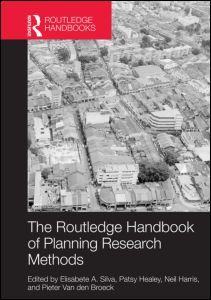Description
The Routledge Handbook of Planning Research Methods
A Case-Based Guide to Research Design
RTPI Library Series
Coordinators: Silva Elisabete A., Healey Patsy, Harris Neil, Van den Broeck Pieter
Language: English
Subjects for The Routledge Handbook of Planning Research Methods:
Keywords
Te Ch; planning research; Lo Piccolo; qualitative research; Vice Versa; quantitative research; Community Development Corporations; research design; European Spatial Development Perspective; research methods; Common Language; urban planning research; Public Administration; Spatial Data Infrastructures; Spatial Planning; Planning Support Systems; African Planning Schools; Spatial Planning Research; Hua County; Predicting Housing Prices; Landscape Metrics; Deliberative Monetary Valuation; Case Study Research Methodology; Strategic Spatial Planning; Model Planning Policies; Civil Society; Built Environment Education; Better Life; Charrette Process; Planning Practice; SDSS
Publication date: 08-2014
· 17.4x24.6 cm · Hardback
Publication date: 08-2016
· 17.4x24.6 cm · Paperback
Description
/li>Contents
/li>Readership
/li>Biography
/li>
The Routledge Handbook of Planning Research Methods is an expansive look at the traditions, methods, and challenges of research design and research projects in contemporary urban planning. Through case studies, an international group of researchers, planning practitioners, and planning academics and educators, all recognized authorities in the field, provide accounts of designing and implementing research projects from different approaches and venues. This book shows how to apply quantitative and qualitative methods to projects, and how to take your research from the classroom to the real world. The book is structured into sections focusing on
Beginning planning research
Research design and development
Rediscovering qualitative methods
New advances in quantitative methods
Turning research into action
With chapters written by leading scholars in spatial planning, The Routledge Handbook of Planning Research Methods is the most authoritative and comprehensive handbook on the topic, providing both established and ground breaking coverage of spatial planning research methods. The book is an invaluable resource for undergraduate and graduate level students, young professionals and practitioners in urban, regional, and spatial planning.
Elisabete A. Silva is a Senior Lecturer in Spatial Planning at the Department of Land Economy, University of Cambridge, UK. Her research interests focus on the application of dynamic urban models to urban planning (in particular GIS, CA, and ABM models). She is the co-author of A Planner’s Encounter with Complexity (Ashgate 2011) and editor of the journal Urban Design and Planning.
Patsy Healey is Professor Emeritus in the School of Architecture, Planning and Landscape, at Newcastle University, UK. She is the author of several widely read books in the planning field, and is particularly known for her work on collaborative planning processes. Recent books include Urban Complexity and Spatial Strategy-Making (Routledge 2007) and Making Better Places (Palgrave Macmillan 2010).
Neil Harris is a Senior Lecturer in the Cardiff School of Planning and Geography, UK. He has engaged in both academic research and consultancy projects for government, professional bodies, and charities. He completed his professional planning education and doctorate at Cardiff and is a Chartered Town Planner.
Pieter Van den Broeck is a Postdoctoral Researcher at KU Leuven, Belgium, and a Spatial Planner for the planning firm OMGEVING. His current research interests are in institutionalist planning theory, planning instruments and planning systems, territorial development through social innovation, and planning for sustainable development.
These books may interest you

Handbook of Urban Mobilities 250.90 €



